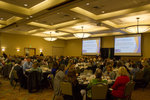



United Way of Lewis County has set a lofty goal for itself — lift 30 percent of families in Lewis County out of poverty by 2030.
At the nonprofit’s Community Partnership Luncheon on Thursday afternoon at Great Wolf Lodge, everyone from the Lewis County business community, to county commissioners, to state legislators attended the event.
Drew Mikkelsen, South Sound Bureau Chief for KING 5 News, was the master of ceremonies. During his introduction, Mikkelsen told the crowd that his first day at KING 5 was Dec. 3, 2007 — the beginning of the flood that devastated Lewis County and other regions of Western Washington more than a decade ago. The crowd audibly gasped.
“Some folks in here probably remember that day,” Mikkelsen said. “That’s when the skies opened up and the mountains crumbled and Chehalis went haywire. I was supposed to go to Seattle to get a computer and a new phone … instead they called me on my flip phone and said ‘Do you know where Tahuya is?’”
After discussing his memorable first day on the job, Mikkelsen discussed Lewis County statistics. He told the audience that 47 percent of people in Lewis County struggle with necessities such as rent, food, heat, transportation, child care and healthcare.
Guest speakers included Centralia City Council member Peter Abbarno, Centralia Police Chief Carl Nielsen and State Rep. Richard DeBolt, R-Chehalis, who is also the United Way of Lewis County Board secretary.
During his speech, Abbarno asked five tables to stand up, and told them to look around. That was the number of people living in poverty in Lewis County — 15 percent. Abbarno asked seven more tables to stand, which represented almost half of Lewis County. Those people were Asset Limited, Income Constrained yet Employed (ALICE) individuals, or people who were one financial burden away from homelessness.
“We have almost 50 percent of this county that is either living in poverty and homeless, or just one day away from being there,” Abbarno said. “... It touches every single one of us when we talk about poverty, when we talk about homelessness, when we talk about struggling families. It’s going to affect every single community.”
Abbarno touched on various aspects of poverty such as homelessness and mental illness, and discussed the struggle to define it.
“You really can’t define poverty, can you?” Abbarno said. “It looks different to every single one of us. What’s interesting, though, when I ask people about poverty and homelessness and what it means to (them), everybody said the same thing — start earlier.”
Abbarno spoke of the importance of addressing poverty and poverty-related issues earlier in households to end intergenerational poverty. He advocated for early identification, early intervention and early education.
“Early — that’s the key to making this work,” Abbarno said.
Nielsen addressed the crowd next, and spoke about working with both United Way of Lewis County and United Way of Thurston County.
“Shortly after coming to Centralia, my staff quickly identified the number one quality of life issue that we were facing was homelessness,” Nielsen said.
Nielsen discussed reaching out to Debbie Campbell and United Way of Lewis County, when he needed assistance coordinating meetings between the police department and various local organizations.
“I worked hard to get my staff out in the community to better understand their needs as well as form relationships,” Nielsen said.
Nielsen also discussed time his staff, both sworn and non-sworn staff, have spent reading to students over the last two years.
“The work these United Way groups do in our communities is truly amazing,” Nielsen said. “They do it with little fanfare and great pride.”
State Rep. Richard DeBolt discussed the United Way of Lewis County’s evolution in the last few years.
“I think it’s been about five years when this journey began for United Way,” DeBolt said. “It’s been painful. Some of your agencies know that, because it’s not the same organization it was years ago. Some of you aren’t getting funded the same way you were years ago.”
DeBolt said the Board of Directors got together at the time and saw there were overlapping services, that the organization wasn’t direct enough with its money and that the organization needed a unified mission.
“The outcome is what matters,” DeBolt said. “Territory does not matter. What you used to do does not matter. It’s what you do tomorrow that changes our community.”
Mikkelsen closed the event by encouraging the audience to donate or volunteer.
“The time to invest in the future of Lewis County is right now,” Mikkelsen said.